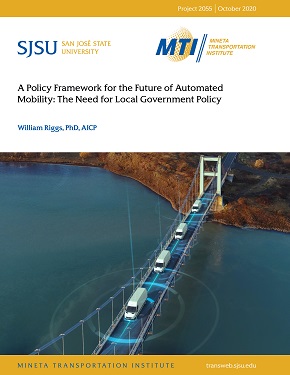- 408-924-7560
- mineta-institute@sjsu.edu
- Donate
A Policy Framework for the Future of Automated Mobility: The Need for Local Government Policy
Rapidly evolving urban mobility ecosystems and recent innovations in autonomous vehicle (AV) and electric vehicle (EV) technologies suggest we are on the brink of fundamental shifts in the urban transportation landscape. Many of these advanced technologies—in particular, autonomous vehicles which are both electric and shared—promise to reduce reliance on the personally-owned gasoline-powered car and have the potential to make our cities safer, cleaner, more inclusive, and more sustainable.
But as these technologies advance in real-time, cities have been hard-pressed to address the many expected shifts in transportation patterns, let alone new policy challenges around data, privacy, cybersecurity, and micromobility. Meanwhile, city, state, and federal governments are increasingly navigating overlapping and cross-jurisdictional policy landscapes as these technologies challenge historically clear areas of responsibility. Globally, the rate of technological change is now largely outpacing new legislation and regulation related to autonomous vehicle technology and other recent innovations in transportation that will shape the cities of our future.
Yet in spite of these challenges, local policymakers across the world are uniquely positioned to harness these technological innovations and deliver a brighter urban future. Cities are currently some of the earliest adopters of autonomous vehicle technologies and are beginning to consider how changes made to today’s built environment can accelerate the deployment of these technologies in the future—considerations such as curb use and demand management, parking redesign, asset maintenance, right of way standardization, and cyclist and pedestrian-friendly projects. These new technologies can help cities meet emerging transportation demand more efficiently and completely, while still supporting critical societal values such as sustainability, social justice, and service equity.
William (Billy) Riggs, PhD, AICP, LEED
William (Billy) Riggs, PhD, AICP, LEED AP is a global expert and thought leader in the areas of autonomy and smart transportation, housing, economics and urban development. He has over 100 publications in these areas and has had his work featured in multiple national media outlets — including the Economist, Wall Street Journal, Washington Post and the Atlantic. He is currently a professor at the University of San Francisco School of Management, director of strategy and research at Sustinere Consulting. He has held additional academic appointments in city planning and transportation engineering from Cal Poly San Luis Obispo, UC Berkeley, San Jose State University, and the University of Louisville.
In addition to his academic roles, Riggs also has almost two decades of experience working as an urban planner, policy maker, economist, and engineer. This includes work as director of research at Sustinere Consulting, the transportation program manager and principal planner for UC Berkeley, an asset manager and engineering technician for the US Coast Guard, and a planning commissioner for the City of San Luis Obispo. He has been both a National Science Foundation Fellow and a UC Transportation Center Fellow and is the founder of ReStreet.com — an online tool for democratizing street design.
Riggs currently sits on the City of Palo Alto’s Planning and Transportation Commission, is a member of the Transportation Research Board (TRB) Committee on Transportation Economics, and provides strategy and consulting to multiple companies on smart mobility and urban development.
-
Contact Us
San José State University One Washington Square, San Jose, CA 95192 Phone: 408-924-7560 Email: mineta-institute@sjsu.edu






